The Media Has Been “Dodging” the “Thorniest” Question for Years
They helped usher Trump into the Oval Office in 2016–and they still won’t acknowledge it.
In 2017, I published a book on the 2016 election that called out the New York Times, MSNBC, CNN, and other satellites of the “mainstream” media for their key role in the widespread Hillary-bash that helped usher Donald Trump into the Oval Office.
I was excited when MSNBC called to arrange an interview.
So there I was, early on Saturday afternoon, my hair freshly styled and my bottom perched on a high stool in a local TV station, fake landscape of Lexington, Kentucky in the background, earpiece plugged into “MSNBC Live.” I had prepared for what I guessed were going to be some key questions about my argument in the book. So I almost fell off my stool when I heard the lead-in:
“Next up: The author of a new book argues that Clinton made one big mistake that probably cost her the presidency.”
Was my earpiece plugged into Kellyanne Conway’s universe of alternative facts?
No, there on the chyron, in bold letters: “CLINTON’S BIGGEST MISTAKE.”
Since my book was an analysis of the perfect storm that assailed Hillary from multiple sides, left, right, domestic and foreign, I was eager—while madly searching my own brain for a strategy to retort without being rude—to hear Sheinelle Jones’ first question.
Ah. Clinton’s “big mistake,” Jones proposed, was that “she allowed the media to shape the narrative.”
Allowed? With “EMAIL SCANDAL” and “CLINTON TRUST PROBLEM” headlined virtually every day, what could she have done?
“You underestimate the media’s power,” I said to Sheinelle.
It may have been the first time an author turned an issue back on the media. And Sheinelle clearly didn’t want to go there. She quickly pivoted to her next prepared question, which was about the power of “optics.” Now, that is an actual argument of my book, and I was ready to talk about the readiness of the media, throughout the election, to headline “suspicious” appearances before the actual facts had become known. (As in: “We don’t know for sure why Clinton needed to be helped into her car that day, but the optics aren’t good. What is she hiding?”)
Sheinelle had in mind something different, though. She produced a video of a Trump rally, and those now-famous cries of “lock her up, lock her up!” Oh, right, all Trump’s fault.
Then she produced a visual detailing the points made in a “blistering commentary” (as she put it) by Andrew Sullivan. It was the then-popular Hillary-blaming litany: She mishandled her campaign, she spent too much time fund-raising, didn’t visit the Rust Belt states, didn’t communicate with the “working class.”
I’d heard all this multiple times, from the earliest post-mortems on the results of the election, in which Sanders enthusiast Michael Moore joined Chris Mathews in dissecting Hillary’s “disgraceful campaign” (as Moore described it.)
But I don’t give up easily. I noted that working class people work, and have little time to follow hearings and speeches as they happen, but depend on the media’s sound-bytes early in the morning and after work. What they got from those fragments were often distortions of Clinton’s policies and speeches.
But Sheinelle was “out of time” and didn’t respond. Instead, she found a handy bow to tie up the undisciplined strands of my answers.
“We will be talking about this for a long time.”
But surprise! They never did.
You might say that for years now, the media has successfully “dodged” the question of their contribution to the disaster of 2016. A few late-in-the-day admissions in the past few years of how they’d harassed Hillary over her emails, But nothing about how they’d misrepresented her comments about Benghazi, coal-miners losing their jobs, or—most significantly—the Trump “deplorables.”
Now that they are having such a fine time accusing Kamala Harris of “dodging” their questions, I thought a reminder might be in order.
Among the questions that Kamala “evades”/“bobs and weaves” around are those for whom direct answers would involve saying negative things about Trump’s supporters. Questions like “How do you explain how tight the race is?” Or: “How do you explain why Trump still has so many voters behind him?” When asked such questions, Kamala “pivots” to talking about Trump himself and/or how her administration would differ from his.
Call that a “bob and weave” if you want. I call it smart. Kamala knows what happened when Hillary made the mistake, at an LGBTQ fundraiser, of speaking about Trump’s supporters.
I’m sure you’ve heard or read, somewhere along the line, how Hillary described (half of) Trump followers as a “basket of deplorables.” Of course you have. T-shirts were emblazoned with it, cartoons and memes and headlines broadcast it. It was among the main talking points that turned Hillary into a caricature of a condescending, snobby “liberal elite.” It was potent, a gift from heaven to Trump.
You may not, however, have seen her remarks in full:
“We are living in a volatile political environment. You know, to just be grossly generalistic, you could put half of Trump’s supporters into what I call the basket of deplorables. Right? The racist, sexist, homophobic, xenophobic, Islamaphobic — you name it. And unfortunately there are people like that. And he has lifted them up. He has given voice to their websites that used to only have 11,000 people — now how 11 million. He tweets and retweets their offensive hateful mean-spirited rhetoric.
Now, some of those folks — they are irredeemable, but thankfully they are not America. But the other basket — and I know this because I see friends from all over America here — I see friends from Florida and Georgia and South Carolina and Texas — as well as, you know, New York and California — but that other basket of people are people who feel that the government has let them down, the economy has let them down, nobody cares about them, nobody worries about what happens to their lives and their futures, and they’re just desperate for change. It doesn’t really even matter where it comes from. They don’t buy everything he says, but he seems to hold out some hope that their lives will be different. They won’t wake up and see their jobs disappear, lose a kid to heroin, feel like they’re in a dead-end. Those are people we have to understand and empathize with as well.
Forget “half” (which Hillary later said was an exaggeration; I’m not so sure that would be true in 2024.) Forget the whole second part of her comments. Just the word “deplorable” was oozing blood for the Republicans.
“Just when Hillary Clinton said she was going to start running a positive campaign, she ripped off her mask and revealed her true contempt for everyday Americans,” Jason Miller, senior communications adviser for Trump’s campaign, said in a statement.
And Republican strategist Frank Luntz: “It is as insulting as any word in the English language. To be deplorable means you have no excuse as a human being. If you’re a deplorable person, it is saying that there is no redeeming quality to you whatsoever.”
But it wasn’t only the Republicans. As has often been the case, the mainstream media latched onto the GOP’s truncated version of Clinton’s comments (they did it with Benghazi and coal, too) and turned it into “breaking news” and opinion pieces:
“It’s very hard to say you have a message of civility and then turn around and talk about how essentially a quarter of the country is, in your view, a basket of deplorables,” said Jonathan Allen, who latter went on to write Shattered, the mainstream’s bible about how Clinton failed the Democrats, “That is a screeching conflict of her overall message, which is we have a civilized country and we need to be stronger together — that this should be a kinder, gentler, unified country.”
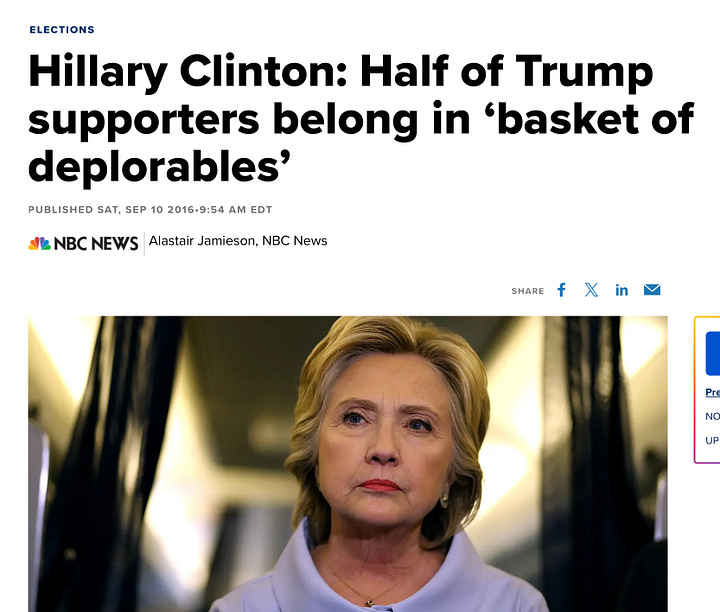
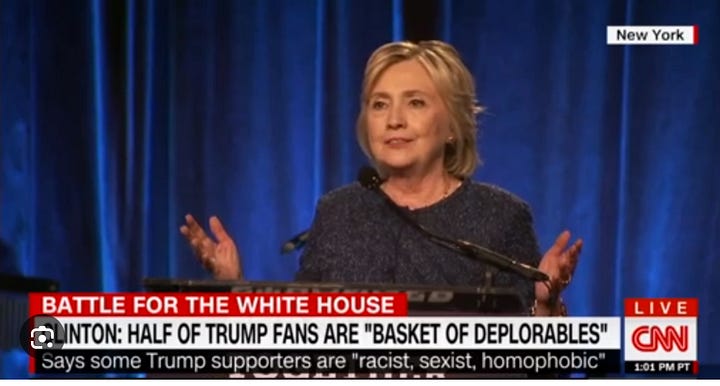
This kind of thing was nothing new for Hillary.
Remember when she was a First Lady who “could have stayed home and baked cookies and had teas, but what I decided to do was fulfill my profession, which I entered before my husband was in public life.”? The media was all over it immediately, quoting, in a Today Show piece, the women who saw it as scornful of their own life choices—“She has no use for us, we have no use for her,” declared one—while neglecting to include the rest of Clinton’s remark. After “cookies and tea,” Hillary had gone on to say, “the work that I have done as a professional, a public advocate, has been aimed . . . to assure that women can make the choices, whether it’s full-time career, full-time motherhood, or some combination.” She clarified but, as she wrote later, “The damage had been done.”
Hillary suffered the consequences of another spontaneous remark later that same year when she was questioned about Bill’s infidelity. Hillary had said she “wasn’t sitting here, some little woman standing by her man like Tammy Wynette. I’m sitting here because I love and I respect him.” Although the Wynette reference was to a famous song, not to Wynette herself, Tammy fired back: “I can assure you, inspite of your education, you will find me to be just as bright as yourself.”
Another clarification, another apology. But by then Hillary was beginning to learn to watch herself around the press.
It’s no wonder that, as she describes it, she learned to “think before I speak” and “sometimes sound careful with my words. [It’s] not that I’m hiding something, it’s just that I’m careful with my words.” The irony is that this caution engendered an abiding, low-level hostility toward her from the media. We saw this frequently during the 2016 election cycle—in complaints about her lack of press conferences, the constant descriptions of her “secretive” and “calculating” responses to the press. “Halting” answers. “Carefully choreographies appearances.”
I noticed creepily similar descriptions about Kamala Harris in 2019. The the first “big” piece I’d seen about her was written by Elizabeth Weil for The Atlantic. “Even sitting with Maya [her sister], post-barbecue, in a corridor of a black church in South Carolina before a town hall—when Harris is laughing and slightly slouched in her chair, seemingly relaxed”—Weil wrote—“she’s a woman who maintains a tight grip on the narrative.” “Tight.” “Grip.” Only “seeming” relaxed. (In fact, always on her guard, always prepared.) Then, after she became the Democratic candidate this year, when Kamala postponed interviews in an attempt to get her “message” and “policies” directly out there to people in swing states, she was accused of hiding behind the safety of “scripted” events like rallies. It brought back to mind how Chuck Todd had accused Hillary Clinton for being “over-prepared” after a splendid debate performance, and the many criticisms of Hillary for lack of spontaneity, for being too “scripted” and “controlled.”
Now, Kamala is doing interviews—lots of interviews—and the press is scornful when she makes a joke, “pivots” to criticisms of Trump, or says “I can’t think of anything” when asked how she differs from Joe Biden. Or, just the past few days, when she was asked what she thought of Barack Obama’s criticism of Black men as not comfortable, perhaps, with the idea of a woman president, she “skated away” (another favorite media metaphor) from commenting on what Obama had said (to a roomful of Black men) and answered by giving her own assessment of the problems Black men are facing, and how she intended to earn their votes by focusing on them.
I believe Kamala is too loyal a person to criticize either Biden or Obama. But loyalty aside, can you imagine the headlines that would be seized on if she did?
I don’t see these as “hard-hitting” questions. I see them as dangerous potholes that she’s right to avoid falling into.
I think the same about questions concerning the Biden-Harris “policy” on the Israel/Hamas war. Besides the fact that Kamala Harris is still Vice-President and engaged with Biden in ongoing negotiations, that situation is simply too complex to allow for a succinct answer, while a multi-faceted, historically contextualized answer would only lend itself to the kind of distorting snip, skip, and paste that plagued Hillary throughout her career. Surely any seasoned journalist ought to know that asking a candidate to wade through complicated international affairs and come up with a response as though it was a multiple-choice question on the SATs isn’t “hardball,” it’s a wide throw that’s inevitably headed into the weeds.
Kamala was on fire at her rallies this week, performing the almost impossible task of exposing how unstable and dangerous Trump is while at the same time outlining (concretely, not just as “concept”) how she plans to make people’s lives better AND projecting her signature “joy.” Can the media manage some enthusiastic praise for those appearances? No. All I heard all day yesterday was how tight the race is, the groups she’s “in trouble with,” and various (usually male) commentators blathering on what she “needs to do.”
She’s already doing it, stupid. And maybe if you amplified that instead of the “dodged” questions that—let’s face it—are more to the media’s advantage than the voters’, the “tight race” that you seem to relish torturing us with might loosen up.
on BordoLines: “There’s no one smarter on Substack, and Susan gives you the gift that every aspiring intellectual needs— even if you’re not agreeing with her on something, you can bet your bottom dollar she put the hours in, and she knows what she’s talking about.”
Thank you , Karl!!





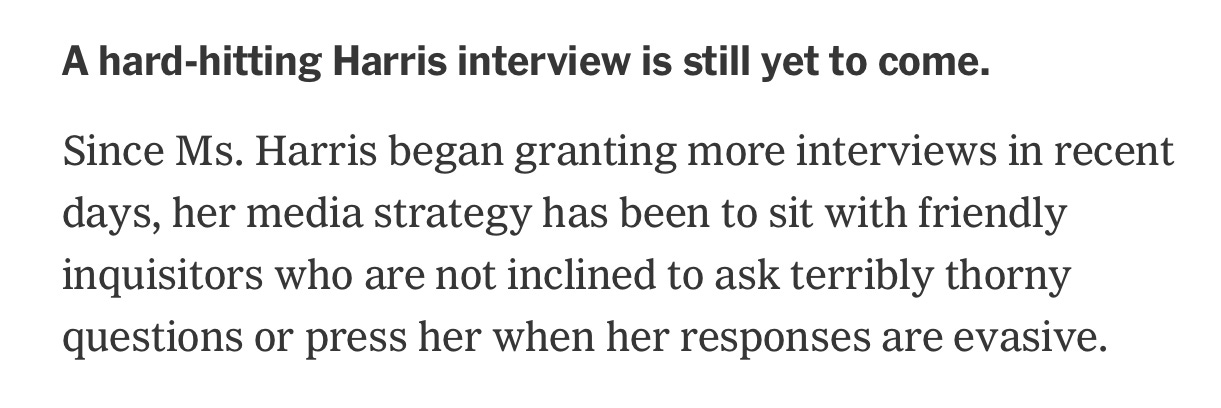
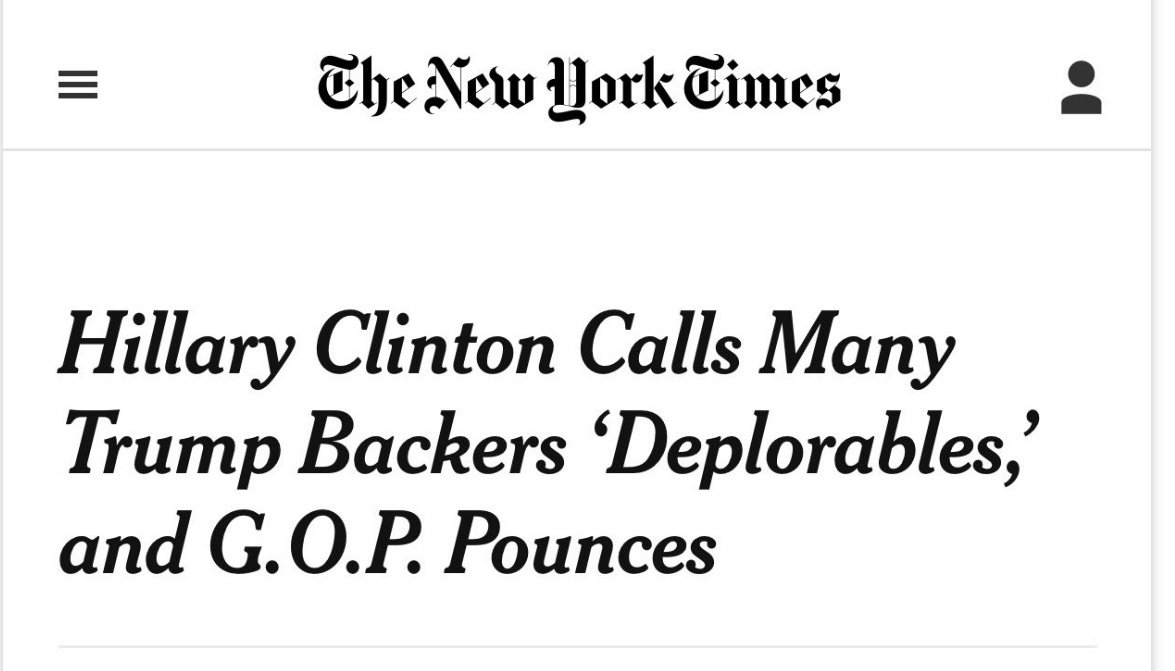
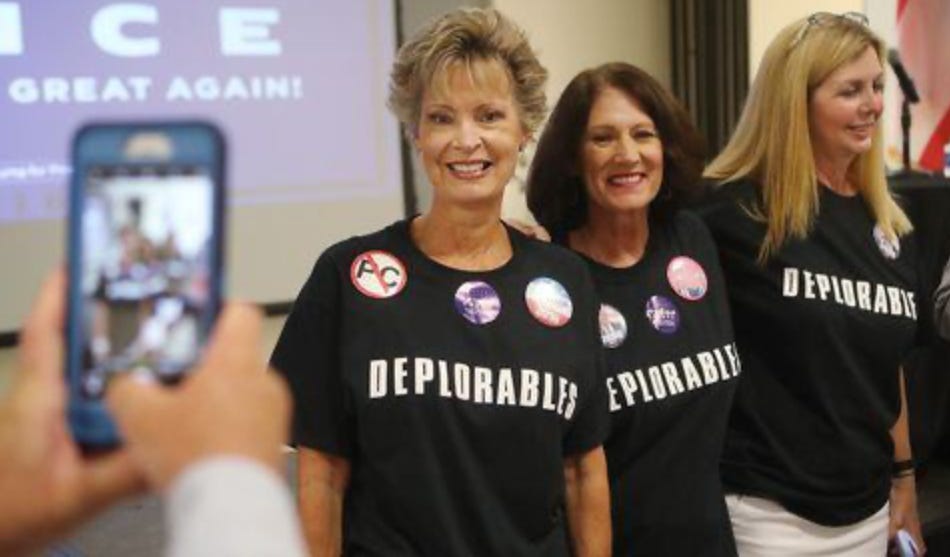
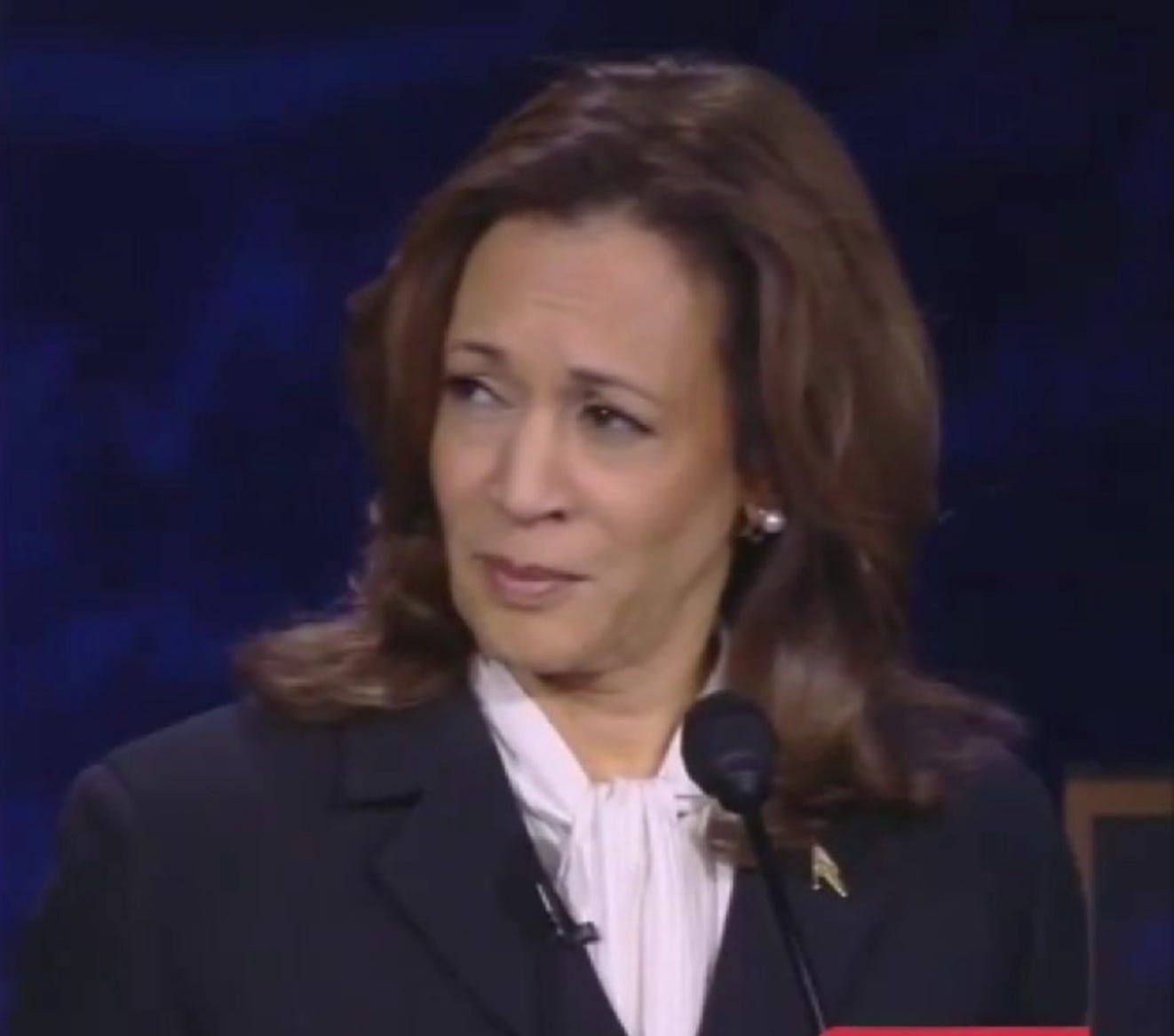
Yes, Susan, Karl gets it right. You are brilliant. This is the most intelligent and thoughtful piece I have read about the awful coverage of Kamala by the press. So glad you reminded us all of the Hillary campaign. And let’s not forget that she won the popular vote in spite of the biased articles.
When people mention the media they may want to focus on profit driven corporations; not an utopian and altruistic fourth estate enshrined in the Constitution whose role keeps voters well informed. Those days have been gone for at least a century. The corporate media's so-called "hard hitting questions" are gotcha traps that stir up doubt and dirt. It's not about informing the voters. It's about increasing viewers/listeners as the justification for raising advertising rates.